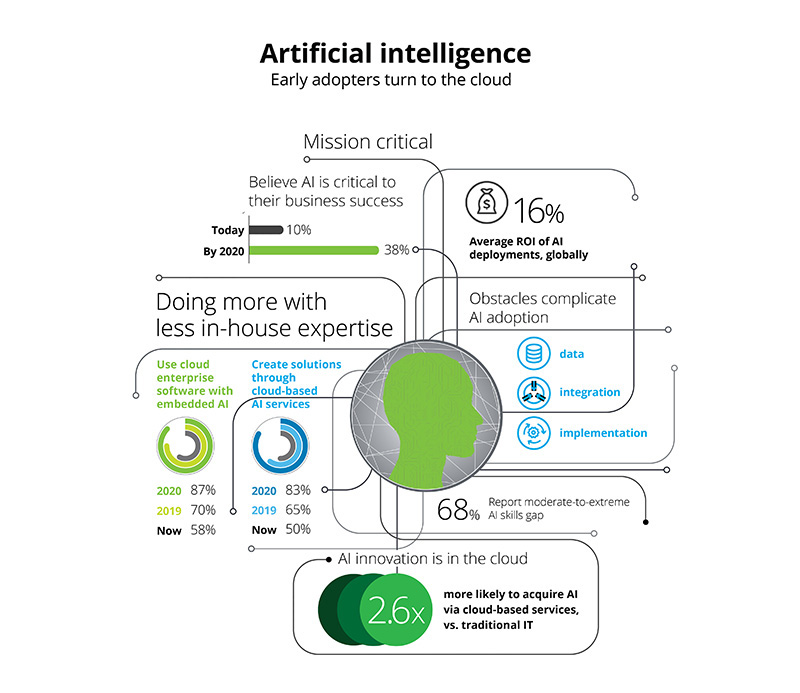“The trouble with AI, however, is that to date, many companies have lacked the expertise and resources to take full advantage of it.”
The key trends that Deloitte predicts for Artificial intelligence:
- In 2019, companies will accelerate their usage of cloud-based artificial intelligence (AI) software and services.
- Among companies that adopt AI technology, 70% will obtain AI capabilities through cloud-based enterprise software, and 65% will create AI applications using cloud-based development services.
- By 2020, penetration rates of enterprise software with integrated AI and cloud-based AI platforms will reach an estimated 87% and 83%, respectively, among companies that use AI software. Cloud will drive more full-scale AI implementations, better return on investment (ROI) from AI, and higher AI spending. Importantly, we will see the democratization of AI capabilities - and benefits - that had heretofore been the preserve only of early adopters.
What is AI?
AI consists of multiple technologies. At its foundation are machine learning and its more complex offspring, deep-learning neural networks. These technologies animate AI applications such as computer vision, natural language processing, and the ability to harness huge troves of data to make accurate predictions and to unearth hidden insights. The recent excitement around AI stems from advances in machine learning and deep-learning neural networks - and the myriad ways these technologies can help companies improve their operations, develop new offerings, and provide better customer service at a lower cost.
Why aren’t companies taking full advantage of AI?
The trouble with AI, however, is that to date, many companies have lacked the expertise and resources to take full advantage of it. Machine learning and deep learning typically require teams of AI experts, access to large data sets, and specialised infrastructure and processing power. Companies that can bring these assets to bear then need to find the right use cases for applying AI, create customised solutions, and scale them throughout the company. All of this requires a level of investment and sophistication that takes time to develop, and is out of reach for many.
What are the benefits to investing in AI and which companies are taking full advantage?
For the reasons above, AI’s initial benefits have accrued mainly to pioneers with the required technical expertise, strong IT infrastructure, and deep pockets to acquire scarce and costly data science skills - most notably the global “tech giants.” They have the resources to engage in bidding wars for increasingly expensive AI talent. They have also invested billions in infrastructure, including massive data centres and specialised processors. For example:
- Google has designed its own AI-specific chips to accelerate machine learning in its data centres and on IoT devices.
- Amazon has used machine learning to drive recommendations for many years. The company is using deep learning to redesign business processes and to develop new product categories, such as its virtual assistant.
- China’s BATs - Baidu, Alibaba, and Tencent - are investing heavily in AI while expanding into areas previously dominated by US companies: chip design, virtual assistants, and autonomous vehicles.
- These tech giants are using AI to create billion-dollar services and to transform their operations. To develop their AI services, they’re following a familiar playbook: (1) find a solution to an internal challenge or opportunity; (2) perfect the solution at scale within the company; and (3) launch a service that quickly attracts mass adoption. Hence, we see Amazon, Google, Microsoft, and China’s BATs launching AI development platforms and stand-alone applications to the wider market based on their own experience using them.
Joining them are big enterprise software companies that are integrating AI capabilities into cloud-based enterprise software and bringing them to the mass market. Salesforce, for instance, integrated its AI-enabled business intelligence tool, Einstein, into its CRM software in September 2016; the company claims to deliver 1 billion predictions per day to users. SAP integrated AI into its cloud-based ERP system, S4/HANA, to support specific business processes such as sales, finance, procurement, and the supply chain. S4/HANA has around 8,000 enterprise users, and SAP is driving its adoption by announcing that the company will not support legacy SAP ERP systems past 2025.
A host of start-ups are also sprinting into this market with cloud-based development tools and applications. These start-ups include at least six AI “unicorns,” two of which are based in China. Some of these companies target a specific industry or use case. For example, Crowdstrike, a US-based AI unicorn, focuses on cybersecurity, while Benevolent.ai uses AI to improve drug discovery.
The upshot is that these innovators are making it easier for more companies to benefit from AI technology even if they lack top technical talent, access to huge data sets, and their own massive computing power. Through the cloud, they can access services that address these shortfalls - without having to make big upfront investments. In short, the cloud is democratising access to AI by giving companies the ability to use it now.

Source: Deloitte State of AI in the Enterprise, 2nd Edition, 2018
and Deloitte Flexible Consumption Models Study, 2018.


